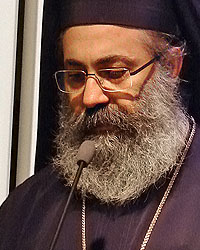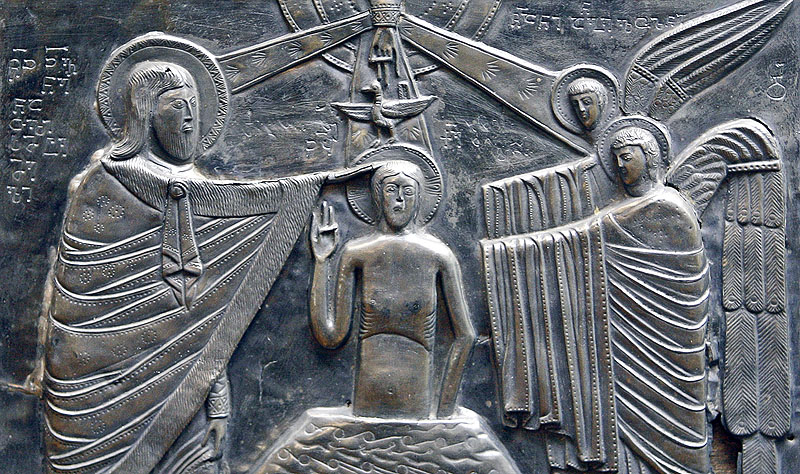The day God was well pleased
6 January 2015This is my beloved Son in whom I am well pleased
(Matthew 3, 17)
 Blessed is he who comes in the name of the lord. The Lord God has appeared unto us! This is the hymn of the Feast of Theophany. It acclaims two matters: the appearance of God to us, and the arrival of the One coming in the name of the Lord, the Man-God Jesus Christ.
Blessed is he who comes in the name of the lord. The Lord God has appeared unto us! This is the hymn of the Feast of Theophany. It acclaims two matters: the appearance of God to us, and the arrival of the One coming in the name of the Lord, the Man-God Jesus Christ.
In Theophany, God did not only appear to man, but also man appeared to God: the man in whom God is well pleased has finally appeared. He is the son and the beloved man in whom God was pleased and satisfied.
It was also shown the way for pleasing God. The image that we have to imitate in order for God to be pleased has been revealed to us. A man has appeared: “He is the one!” The man awaited by God has finally come, so “Blessed is He who comes in the name of the Lord!”
The most beautiful call directed by God to one who pleases Him is: “My beloved Son.” God is love. In His love, God does not favor one over another. The beloved Son of the Father is the Son who loves the Father. So the human picture that appeared to us and is pleasing to God is not just the image of a man loved by God. This is the symbol of all created being. The image that appears today is the one that loves the heavenly Father to the end, to death, the death of the Cross.
God is eternal love and His love encompasses everyone. He showers His blessings on both the righteous and evil people. This was seen from the beginning. What needs to appear now is the image of the Christian, who, on the likeness of Christ, ought to love God filially, in return to His love. The loving Father is clearly shown. The son, or the man who is called the beloved son, needs to be seen.
In Theophany, the Trinity appears as a living divine love. The gladness of the Father appears to His beloved sons. It is the image of Jesus who answered the perfect Divine Love by perfect human love. God is not pleased except by the return of all to Him, living with Him. This is the divine longing and pleasure.
And throughout the ages, Christians and others tried to please God, each accordingly to his or her faith. People have offered to gods different worship and sacrifices to please them, according to their ideas and conceptions of the divinity. In the Holy Scriptures, the Ark of the Covenant contained the tablets of the Commandments. So people offered sacrifices, worship and burnt offerings as a sign of reconciliation with God, trying to please Him. Many times, however, the Prophets raised their voices, reminding that God is not pleased with burnt offerings, and could not be reconciled with offerings. Repentance is the reconciliation and the sacrifice to God is a broken spirit.
God is love and he desires that His children to be always beloved and loving. Our relationship with God cannot be built on fear and selfish interests, but on love. “God is the Lord and has appeared to us.” Thus He waits for our dynamic answer to His love.
Fasts, prayers, all the offerings and all what we call Christian virtues are not a necessity to God, but are important to man, and not to be offered as ransom, God-forbid!, for He is not the Judge. God is the loving Father. So all these are tools to make our heart love God. Virtues are tools that have no value in themselves. Their value is in making our hard heart softer, transforming our love of the temporal to loving the face of the heavenly Father
We fast to love God, we pray for the same purpose, and also we give alms. A virtue that does not increase our love for God and our longing to the face of the Lord Jesus Christ, is a labor without fruits.
God loves and wants to be loved. Our salvation is to love Him.
God was pleased when he could call His only begotten Son “beloved.” He awaits the moment to call us by the same. God has appeared in the feast of Theophany as a loving Father. And we have in this feast to pray in order for us to become loving sons. We pray so that the name “beloved” be suitable for us, pleasing the heart of God the Father. Amen.
Source: http://paulyazigienglish.wordpress.com/







